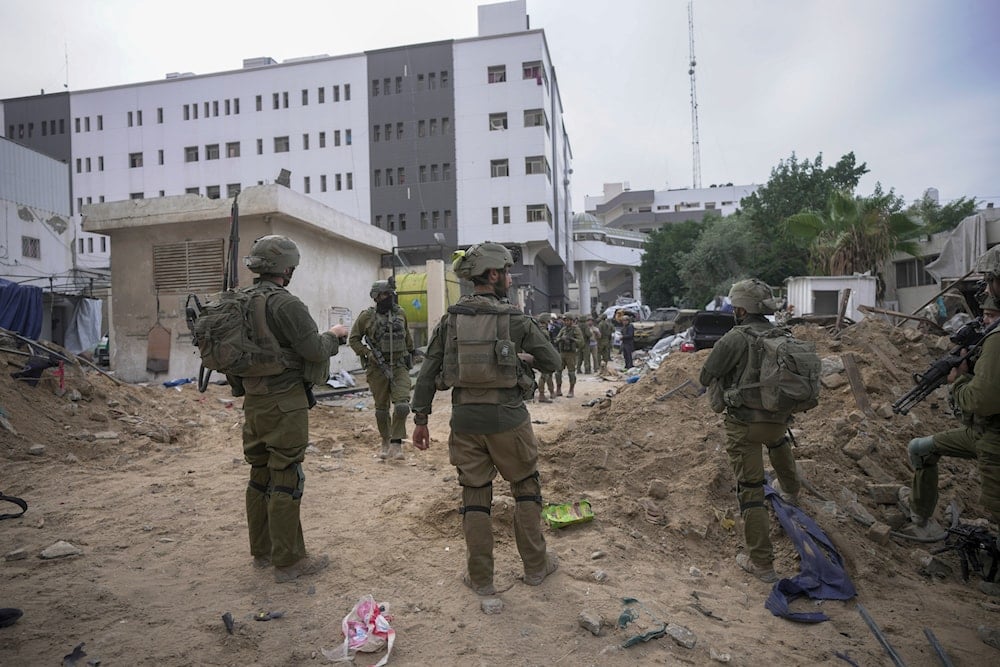Dwindling Israeli manpower should concern every settler, expert says
The Israeli occupation's faltering military capabilities, especially in terms of manpower, are a cause of concern for one of the occupation's top national security experts.
-

Israeli occupation soldiers stand outside Shifa Hospital in Gaza City, occupied Palestine, November 22, 2023 (AP)
In a recent interview with Israeli Channel 12, Israeli national security expert Kobi Marom expressed deep concerns about the future of the Israeli occupation forces (IOF) and the broader implications for Israeli society.
Marom highlighted alarming statistics regarding the IOF's manpower, suggesting that these should worry every Israeli amid a decade of unprecedented security challenges.
Marom attributed the significant manpower shortage to the Israeli military failure on October 7, stating, "Everyone in uniform feels guilty for failing in their primary mission of protecting civilians. This, coupled with the unrestrained criticism from cabinet ministers directed at the Chief of Staff and the military, has demoralized the forces."
"No one wants to be part of an organization that has become a punching bag during such a difficult war," Marom emphasized, pointing out a growing lack of trust not only from the public towards the military but also within the military ranks themselves.
Discussing the Israeli occupation's position on the global stage, Marom noted, "I believe Iran is observing the situation over the past nine months with great satisfaction. They see American weakness and Israel's failure on October 7, which has emboldened Iran. The situation in the north is also tied to Hamas' survival conditions," he added.
Read next: 'Israel' faces resource shortages amid war on Gaza and Lebanon
Marom concluded with a somber message, stating that the Israeli regime must find ways to deter Iran in light of its increasing power and confidence.
The head of the Merom HaGalil Regional Council, appearing on the same Israeli channel, remarked on the unpredictable nature of escalation in the north. "No one can pinpoint the start and end of a war in the north, i.e., with Lebanon. Israel will not announce when it plans to go to war, making discussions about this issue frivolous."
He stressed the necessity of military operations in southern Lebanon, noting, "Without a military operation in southern Lebanon, it will be extremely difficult to secure the north and the towns adjacent to the border fence, where Hezbollah remains entrenched on the other side."
Reflecting on the current state of displaced settlers, he added, "We are refugees; the hotels have become refugee camps in every sense of the word."
Waning, limited capabilities
The Financial Times reported last week that US officials had issued a warning to the Israeli occupation regarding its "limited ability to defend itself" if it were to engage in an open war with Hezbollah.
The report describes Hezbollah as one of the most heavily armed non-state actors in the world, highlighting the difficulty the Israeli occupation would face were it ever to engage in such an endeavor.
According to the newspaper, diplomats have conveyed that both the Israeli occupation and Hezbollah have informed the United States of their mutual desire to avoid a full-scale war.
Meanwhile, Newsweek said another war between "Israel" and the Lebanese Resistance, Hezbollah, could bring "untold devastation" to both and would be Israeli Prime Minister Benjamin Netanyahu's greatest obstacle yet.
Although it would not be the first, Israeli officials are worried the situation could lead to total disaster in the region.
Eran Etzion, who served as deputy head of "Israel's" National Security Council during the last war in 2006, told Newsweek that the war would bring unprecedented destruction to "Sensitive areas" within the occupation, detailing that he believes "Israel" would lose "within 24 hours" and emphasizing that it was difficult to see how the war "can be won quickly, or at all."
"From my perspective, I think it's going to be a war that Israel will lose within the first 24 hours," he said, adding that "simply because of the pictures we will see of mass destruction in very sensitive areas within Israel on a scale we've never seen before."
According to Israeli military officials, Hezbollah has roughly 200,000 rockets, mortars, drones, surface-to-air missiles, anti-tank missiles, precision-guided munitions, and other weapons.

 4 Min Read
4 Min Read









